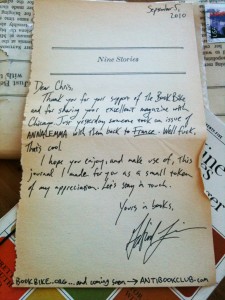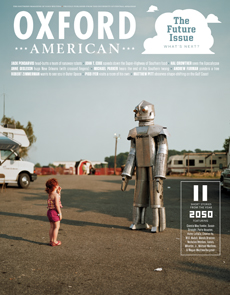 Writers at Luna Park examine the present and future of reading. In “Conflict of Interest?” Greg Weiss looks into the seeming discrepancy between the levels of readership and writership in contemporary poetry. And in “Benjamin Kunkel, Benadict Anderson, and the Fate of the Novel,” David Backer responds—in a roundabout, essayic sort of way—to Benjamin Kunkel’s commentary on the past and future of the novel this past summer at n+1.
Writers at Luna Park examine the present and future of reading. In “Conflict of Interest?” Greg Weiss looks into the seeming discrepancy between the levels of readership and writership in contemporary poetry. And in “Benjamin Kunkel, Benadict Anderson, and the Fate of the Novel,” David Backer responds—in a roundabout, essayic sort of way—to Benjamin Kunkel’s commentary on the past and future of the novel this past summer at n+1.
Gerald Howard’s recent essay on working class writers in the new Class in America issue of Tin House gets some attention from Will Wlizlo at Utne Reader, who writes that Howard’s piece is “thoroughly researched and deftly reasoned.”The essay begins with some interesting, and I think correct, claims:
I don’t suppose anyone has ever done an in-depth study of that interesting form of literary ephemera, the author dust jacket biography. But if they did, I’m sure they would notice a distinct sociological shift over the past decades. Back in the forties and fifties, the bios, for novelists at least, leaned very heavily on the tough and colorful professions and pursuits that the author had had experience in before taking to the typewriter. Popular jobs, as I recall, were circus roustabout, oil field roughneck, engine wiper, short-order cook, fire lookout, railroad brakeman, cowpuncher, gold prospector, crop duster, and long-haul trucker. Military experiences in America’s recent wars, preferably combat-related, were also often mentioned. The message being conveyed was that the guy (and they were, of course, guys) who had written the book in your hand had really been around the block and seen the rougher side of life, so you could look forward to vivid reading that delivered the authentic experiential goods. (Link to full text)
 Gabriel Levinson (of Book Bike fame) sent some craft-love to the editors of Annalemma in the form of a journal made from a book of Salinger stories. At right is a pic of the note Levinson sent along with the gift. Can any editor ask for a better response from a reader? Of the gift, I quote Levinson himself: “Well fuck. That’s cool.”
Gabriel Levinson (of Book Bike fame) sent some craft-love to the editors of Annalemma in the form of a journal made from a book of Salinger stories. At right is a pic of the note Levinson sent along with the gift. Can any editor ask for a better response from a reader? Of the gift, I quote Levinson himself: “Well fuck. That’s cool.”
And tantalizing new issues from the bigger of the littles—
The City Issue from Lapham’s Quarterly:
If the city is a sewer of vice and a slough of despond, why do so many people choose to live there? On what toxic landfill does the city stand as the embodiment of its ennobling cognate, civilization?
 And the Future Issue of Oxford American:
And the Future Issue of Oxford American:
This fall, The OA brings you our Future Issue. Our visions include the Internet-fueled fears of Jack Pendarvis; William Caverlee calling upon Walker Percy’s prophecies; Anne Gisleson coping with change in New Orleans; a surreal Frank Gehry structure beheld by Matthew Pitt; and Hal Crowther’s version of the apocalypse.
But our greatest fears and unfathomable dreams come to light in our special section: “The Future of Fiction: Visions from 2050” wherein eleven adventurous storytellers probe our all-too-human desire to ascertain what is to come: sexually active nonagenarians, happy pills, viral false information, and deleted childhood memories.
Every Tuesday, Travis Kurowski presents Luna Digest, a selection of news from the world of literary magazines. Travis is the editor of Luna Park, a magazine founded on the idea that journals are as deserving of critical attention as other artistic works.
Sep 21st, 2010 at 9:14 am
how timely! there must be something in the air or in the water, because in the general fictionaut discussion forum, we’re battling similar ghosts: the thread http://www.fictionaut.com/forums/general-forum/threads/457 originally started as one writer’s question if fictionaut was good or bad for publishing but has now morphed into a much farther ranging discourse involving vampires, bourdieu and issues of monetizing your awesome writing talents…other than some of the references mentioned in this blog post, the discussion is not technology- or digitization-centered. IMO, this misses the point in a similar fashion in which the current, fear-fueled debate around the e-book in the publishing industry misses the boat. it’s not about the device, it’s about the relationship between creative writers and creative readers…